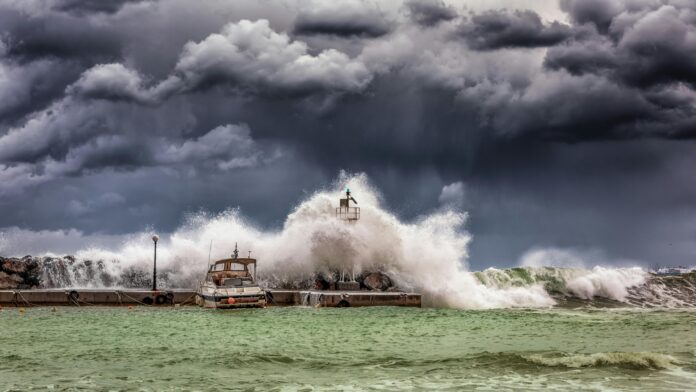I have a grandson who is both mildly autistic and a weather aficionado. As a result, I must wait for my daily call from him to hear about the weather where I am located, where he is located, and any unusual weather occurrences in the country or even across the world. “Cyclone bombs” and “atmospheric rivers” were foreign to me when I was a child, but they easily flowed off his tongue. As recently as February of this year, they were genuine terms to the residents of Los Angeles and the surrounding area as heavy storms pummeled the region with high amounts of rain that, in turn, caused mudslides and other disasters that toppled trees, crushed homes, washed away roads, and caused mountains to slide down with tons of mud and debris. Images of people being rescued from the tops of their cars and out of their homes, and of remote pieces of land that were newly created islands, dominated the news cycle as the weather changed the topography around them.
This severe weather also reminded me that life as we know it can change just as quickly. Our lives can be turned upside-down and inside-out with a change in our health or that of a loved one. I was shocked once again on Sunday when I went to church and observed one of our older members, now in a wheelchair, as his Parkinson’s disease has continued to advance. While he experienced a gradual decline, for others it can be as quick as flipping a switch. This reminded me of a story:
Once upon a time, a gentleman was sleeping soundly in his bed; in the middle of the night, he was awakened by a sharp knock on the door.
He opens the door downstairs and there stands his very agitated neighbor, who says, “Get dressed, and let’s get out of here. Haven’t you heard the weather report? The river is going to flow over the banks and this whole area will soon be flooded. We have to get out of here!”
And the fellow says back, “I’m not worried about any flood. I’ve lived here more than forty years and that river has never flooded. No reason for me to think it will now. I’m not leaving. I’m not worried. And besides,” he says, “I trust in the Lord.” He shuts the door, goes back upstairs, and returns to sleep.
A couple of hours later he is awakened by the sound of running water, and he goes over to his bedroom window and looks out; by golly, the river has flooded, and it is about as deep as his first story. He sees the sheriff coming toward him in a boat and the sheriff says, “Get in the boat and we’ll get you out of here. The river hasn’t crested yet and it will worsen. Get in here, and we’ll rescue you.”
But the guy says back, “Don’t worry about me. That ol’ river is not going to get any deeper than this. I’ve lived here forty years and am not about to abandon my property now. You go rescue someone else. I’m staying right here. And besides,” he says, “I trust in the Lord.”
Well, the next time we see him, he’s on the roof and clinging to the chimney and the waters are up around his knees. A National Guard helicopter flies by, hovers, and a soldier comes down on a long cable and says to him, “Here, put this vest on and we’ll lift you out of here! Hurry, the flood is getting worse.”
But the guy waves him off and says, “It couldn’t possibly get any worse than this. I’ll just take my chances right here. Besides,” he says, “I trust in the Lord.”
As you can probably guess, the next time we see him, he’s at the Pearly Gates and raising an awful fuss with Saint Peter. “I can’t understand it,” he says. “How can it be that I got swept away in that flood and drowned? Why didn’t you and the angels up here do something? Why didn’t you help me? I trusted in the Lord, but I drowned. Why didn’t you help me.”
And Saint Peter calmly replies to him, “My friend, I don’t understand why you are complaining. We did try to rescue you. We sent you your neighbor, the sheriff’s department, and the National Guard. What more did you want us to do?”
A flood is coming, and the name of the flood is long term care. There are 77 million Baby Boomers headed toward old age. Every person reading this article will be touched by the issue of long term care, either because you will need care or because you will help provide care for a loved one. As Roslyn Carter said, there are four kinds of people in this world: “Those who have been caregivers, those who are currently caregivers, those who will be caregivers, and those who will need caregivers.”
A flood is coming, and we are warning you to prepare for it.
It starts with the fact that we are each given a certain amount of time on this Earth, and then one of two things happens: We either die quickly or slowly.
I lost my dad in a matter of days. I didn’t even get to say goodbye to him in person because he died so quickly on a Friday morning out in Arizona. I had talked to him on Sunday before departing on a business trip to Chicago the next day. I had plane tickets to go out there the following Monday for a routine visit. Instead, I used the ticket to go out and bury him. It was that unexpected.
On the other hand, I watched all four of my grandparents die very slowly, some at home and some in nursing homes. For my grandmother who suffered from dementia it was a long goodbye, as she first lost her mind before her body finally wore out as well.
If you die quickly like my dad, it’s cheap. If you don’t die soon but instead go slowly or linger, it can be costly.
If you are unfamiliar with the cost of long term care in the United States, the national average is approximately $110,000 annually. The average stay in care is three years, which means we are looking at more than $300,000 in today’s dollars. And that’s if you are average! Some will linger much, much longer. I know one claimant who is only 32 years old and another who is the oldest at 103. The most extended current claim with the leader in long term care insurance has eclipsed 24 years and $1.6 million in benefits paid. Long term care can be costly. Fortunately, the insurance to guard against it is not.
Clients work with a financial advisor or estate planning attorney because they want them to protect and grow their money. There is no single more significant threat to their future financial health than the threat of long term care. The risk they face as a couple at age 65 is 90 percent that one will be in care, which means the other will provide this care. Unless this is why they have worked all their lives to accumulate wealth and have specifically earmarked this money for their long term care costs, we need to talk.
A flood is coming…
For some reading this article, I’m your neighbor. You’ve never thought about this before, and I’m here to tell you, a flood is coming.
For others, I’m the sheriff in the boat. You’ve been thinking about this but procrastinating, and I’m telling you it is time to act.
And for some of you, I’m the fellow at the end of the rope dangling from the helicopter. I am your last, best hope, because your health is going to change in the next six months and then the issue will be decided for you.
Long term care is a complex topic; one size does not fit all. I also find that most clients probably already have a host of questions pertaining to their situation. A long term care plan can be tailored to them as individuals or couples. Although long term care insurance isn’t suitable for everyone, everyone needs a plan. Let us help you determine the proper plan for you and your clients.


























